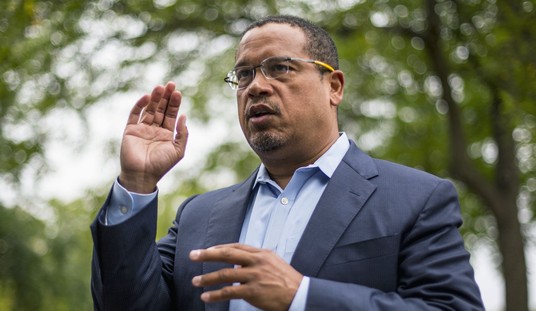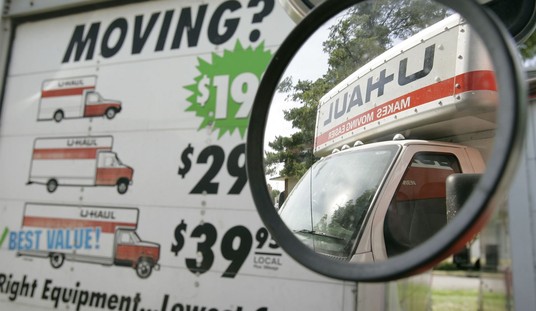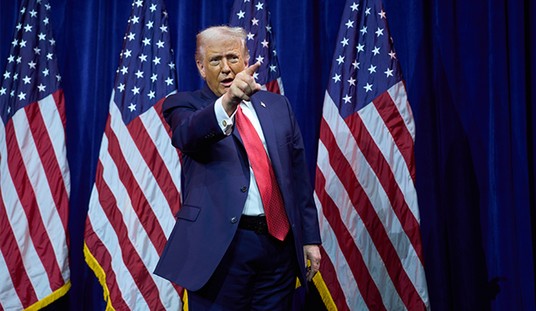Last night, the House Republican leadership held a press conference to discuss the economic bailout package, which they now support. John Boehner, Eric Cantor, Roy Blunt, and Adam Putnam explain that the new package greatly reduces — but does not eliminate — taxpayer risk. It improves the original Paulson plan, and Boehner notes who is responsible for the House GOP even getting a seat at the table:
But I think I’ve made clear to many of you that if it were not for John McCain supporting me at the White House when I said whoa, whoa, time-out, they would have run over me like a freight train.
Before McCain arrived in Washington, the Senate and the House Democrats figured they could force the Paulson plan down the throats of House Republicans. Afterwards, Nancy Pelosi and Harry Reid had no choice but to deal with Boehner and the conservatives, and making changes to the package to get their support. Also, Boehner announced that McCain has begun making calls to get Republican votes for this bill, which shouldn’t surprise too many who had listened to McCain over the weekend.
Are House conservatives happy? Not really, but it looks like they have done the best they can do to keep the long-term costs to taxpayers as low as they can.
Transcript follows:
Putnam: The economic challenges that our nation faces with the collapse of the country’s largest bank, Washington Mutual, others in Europe and in the United States also following that same route. Politically, we’ve also seen some remarkable events where both major presidential candidates came together on a joint statement of principles on the necessary package to avert an economic crisis in this country, the likes we haven’t seen in this country in generations.
We have just completed a good republican meeting to discuss with our members respectfully with each other how we can best move forward and frankly how this package has changed and evolved because of the ideas that have been injected into that discussion by John Boehner and Roy Blunt and Eric Cantor and others who believe that the original Paulson plan wouldn’t pass muster here. It has changed and improved and done all of those things on a bipartisan basis. And so I would like to introduce the leaders who have been working around the clock on that effort beginning with our Minority Leader John Boehner.
Boehner: Adam, thanks. The American people are angry about the situation they find themselves in, but little control over it. I got to tell you my colleagues are angry about the situation they find themselves in. Nobody wants to have to support this bill. But it’s a bill that we’ve come to and worked on together. It’s a bill that we believe will avert the crisis out there. We’re certainly hopeful it will avert the crisis out there.
When we stood up and blocked the so-called deal last week, we did so because we didn’t think taxpayers were being protected. Over the course of the last three days, a number of the members led by Paul Ryan and Eric Cantor, really did craft an alternative that made a giant improvement in the final product that we’re going to be looking at.
I think that if you step back and look at this bill, it’s a bill that does entail taxpayer risk. But I think what you see is we’ve reduced the amount of taxpayer risk in this bill considerably. And if you look through the entire bill when you get to the end of it, if after five years the taxpayers have in fact lost any money, it really requires us to go to those who benefited from this bill and to recoup that money. So at the end of the day, there are no taxpayer funds at risk here.
We do know what is at risk today and that’s our economy. That’s why we’re supporting this bill. We have urged our colleagues to support this bill. We’ve had a long conversation with our members because they’ve got concerns. They want to do the right thing on behalf of their constituents and their country. That doesn’t always mean the word yes. But we’re working with our members and want them to support this because it is the right thing to do for our country. Roy?
Blunt: Thank you, John. We had a chance, when our conference started, we were able to see the final product. The final product is now available to all members. It’s not exactly the bill we would have drafted certainly, but it’s a long way where it was a few days ago with substantially more taxpayer protections.
I think you can much more adequately describe this bill now, because of the elements that have been put into it , as a workout of the problem rather than a bailout of the problem. As long as we were bailing out somebody, that didn’t make sense to the American people. We’re working through a problem that ensures that the American people continue to have access to credit to start businesses, to build houses, to do the things that they need to do for themselves and family. It does begin to make sense. We’re going to do our best to be sure that message is the message that we’re going to be carrying forward.
We had a long session with our members – none of whom had seen the bill. They read all of the reports, but hadn’t seen the bill. Essentially this was a session of just answering questions. And one of the principled questions was how adding this insurance element, this guarantee element to the tools that this Secretary of the treasury and the next Secretary of the Treasury would have will make a difference in how we work out this problem, and how we protect taxpayers. And Eric Cantor and the group he put together did so much to make that a workable alternative and really turn this bill around in the eyes of many of our members. Eric, why don’t you talk about that.
Cantor: Good evening. The working group plan, which is I guess now known as the government backed insurance plan, or these mortgage backed security pools is premised on the notion that what we are trying to do is lessen the burden on the taxpayers and at the same time ensure that Wall Street shares in the cost of this recovery. Plain and simple, we’re substituting out taxpayer dollars out for purchase and instead bringing in insurance premiums from those who will benefit from the government guarantee. As we said earlier, about the bill in general and certainly this provision, which we think will ultimately result once the credit markets have returned back to some confidence after the initial injection of taxpayer dollars, this insurance program will end up being very successful as owners of these assets that are the good assets, but victim of these other toxic assets. We’ll take advantage of the insurance program, which is mandated to be created in the statute.
Q: [ Inaudible question ]
Boehner: We’ve made it pretty clear to our members that we are supporting this bill. We also have made it clear to our members we expected as many of them who could vote for this to vote for it. But this was more about an informational session, answering our questions, allowing members to voice their opinion. I think the real work will go on over the next few hours.
Q: How involved has McCain been in this, in getting votes and making calls to members?
Boehner: He has been making calls to members in support of this bill. But I think I’ve made clear to many of you that if it were not for John McCain supporting me at the White House when I said whoa, whoa, time-out, they would have run over me like a freight train. And I’m grateful for his support.
Q: Mr. Leader, tomorrow, if it gets to the vote and the vote is very tight, it appears that the republicans will have to be the ones to pull this across the finish line —
Boehner: I’m encouraging every member of our conference whose conscience will allow them, to support this bill. Thank you very much.







Join the conversation as a VIP Member